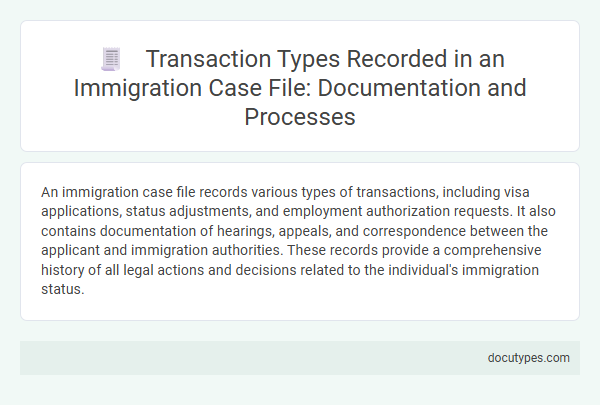An immigration case file records various types of transactions, including visa applications, status adjustments, and employment authorization requests. It also contains documentation of hearings, appeals, and correspondence between the applicant and immigration authorities. These records provide a comprehensive history of all legal actions and decisions related to the individual's immigration status.
Overview of Transaction Types in Immigration Case Files
Immigration case files document various transactions crucial for tracking the progress and status of an individual's case. These transactions provide detailed records essential for legal review and decision-making.
- Application Submissions - Records of all forms and petitions submitted by or on behalf of the immigrant, including visa applications and asylum requests.
- Government Correspondence - Includes all communications between immigration authorities and the applicant, such as notifications, requests for evidence, and decision letters.
- Case Updates and Actions - Documentation of interviews, hearings, biometric data collection, and status changes throughout the immigration process.
Initial Application Submissions and Receipts
Immigration case files meticulously document various transactions to ensure accurate tracking of an applicant's progress. Initial application submissions and receipts serve as foundational records in this process.
- Initial Application Submission - This records the date and details when an applicant formally submits their immigration forms for review.
- Payment Receipts - Receipts confirm that application fees have been paid and are linked to the respective case file.
- Supporting Document Attachments - All relevant supporting documents submitted alongside the application are cataloged for reference and verification.
These recorded transactions form the basis for subsequent case processing, ensuring transparency and accountability in immigration proceedings.
Request for Evidence (RFE) and Responses
Immigration case files meticulously document all communications and transactions between the applicant and immigration authorities. Request for Evidence (RFE) and corresponding responses are critical components, ensuring that additional necessary information is formally recorded.
- Request for Evidence (RFE) - An RFE is an official notice issued by immigration agencies to request more documentation or clarification on submitted applications.
- Response to RFE - The applicant's submitted evidence addressing the RFE is documented to validate compliance and assist in case adjudication.
- Case File Updates - Both RFEs and their responses are timestamped and stored chronologically to maintain a transparent record of the case progress.
Biometrics Appointment Notices and Records
Immigration case files include various transactions, such as application submissions, status updates, and correspondence records. Biometrics appointment notices are a critical component, detailing scheduled dates and locations for fingerprinting, photographs, and signature collection. These biometric records serve as essential identification data used to verify applicants' identities throughout the immigration process.
Interview Scheduling and Outcomes
Immigration case files document various types of transactions, including interview scheduling and outcomes. These records provide detailed timelines and decisions related to applicant interviews conducted by immigration authorities.
Interview scheduling entries capture dates, times, and locations arranged for applicant meetings. Outcomes recorded include approval, denial, requests for additional information, or rescheduling notices, ensuring a comprehensive case history.
Approval, Denial, and Notice of Action Documents
What types of transactions are recorded in an immigration case file? Immigration case files typically include documents related to approval, denial, and notices of action. These records track the progress and decisions made regarding your immigration application.
Filing Fee Payments and Refund Transactions
Immigration case files document various transactions, including filing fee payments submitted by applicants. These payments are essential for processing applications and petitions.
Refund transactions are also recorded when fees are returned due to application withdrawal or denial. Accurate tracking of these transactions ensures transparency and proper financial management within immigration services.
Appeals, Motions, and Reopenings Documentation
| Transaction Type | Description | Key Documentation |
|---|---|---|
| Appeals | Formal requests submitted to a higher authority challenging a previous immigration decision. Appeals seek to overturn or modify rulings related to visas, deportations, or asylum cases. | Notice of Appeal, Appeal Briefs, Decision from Appellate Body, Supporting Evidence |
| Motions | Petitions filed to request the immigration court or agency to reconsider, reopen, or resettle a decision without proceeding to an appeal. Motions may cite new evidence or legal errors in prior rulings. | Motion to Reopen, Motion to Reconsider, Supporting Affidavits, Legal Arguments |
| Reopenings | Procedural actions aimed at reversing a closed or final immigration case when significant new facts or evidence emerge. Reopenings allow further review or continued processing of the case. | Request to Reopen, New Evidence or Documentation, Court Orders, Case Updates |
Case Transfers, Updates, and Status Notifications
Immigration case files record various types of transactions including case transfers, updates, and status notifications. Case transfers document the movement of an application or petition between different agencies or departments handling immigration matters. Updates consist of new information added to the file, such as evidence submissions or interview results, while status notifications inform applicants about progress changes, approvals, or requests for additional documentation.
What Types of Transactions Are Recorded in an Immigration Case File? Infographic

